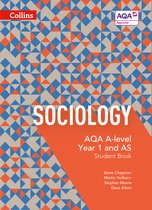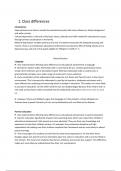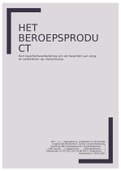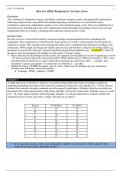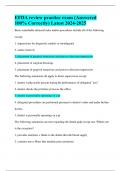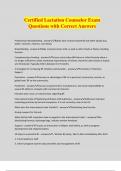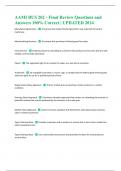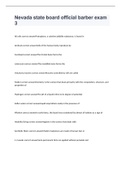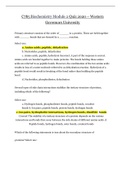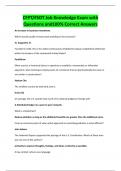1. Class differences
Introduction
External factors are factors outside the educational system like home influences, family background
and wider society.
Cultural deprivation is the lack of the basic values, attitudes and skills needed for educational success
through primary socialisation in the family.
Material deprivation includes poverty and a lack of material necessities like adequate housing and
income. There is a link between educational achievement and poverty, 90% of failing schools are in
deprived areas and only 1⁄3 of pupils eligible for FSM get 5+ GCSE A*- C.
External factors
Language
P - One external factor affecting class differences in educational achievement is language
E - Bernstein’s speech codes. Restricted code is used mainly by w/c, contains grammatical errors,
simple short sentences and is description based. Whereas elaborated code is used by m/c, is
grammatically complex, has a wider range of vocab and is more analytical.
E - Early socialisation of the elaborated code makes the m/c fluent and ‘feel at home’ in the school
environment. This is because the elaborated is used by the teachers, textbooks and exams and is
more effective for analysing and reasoning which is needed in education. This makes m/c more likely
to succeed in education. On the other hand the w/c are disadvantaged because they need to learn a
new code as they haven’t been socialised into the elaborated code and so need more time to catch
up.
E - However, Troyna and Williams argue that language isn't the problem, school attitudes are.
Teachers have a speech hierarchy of m/c on top followed by w/c and black at the bottom.
Parents education
P - One external factor affecting class differences in educational achievement is parents education
E - Parents' education significantly impacts their parenting style, which can impact their children's
educational achievement. M/c parents are more educated. They use their own knowledge and
experience to help their children achieve. For example, they emphasise discipline and high
expectations like making sure their children complete their homework and are more likely to attend
parent evenings.
E - This encourages m/c students to work hard to meet those expectations. On the other hand
Douglas argues w/c parents are less interested, place less value on education and so are less likely to
visit schools. This means w/c students may be less ambitious and receive less support. This difference
makes w/c more likely to underachieve than their m/c counterparts.
, E - However Blackstone and Mortimore argue w/c parents attend less parent evenings due to long
irregular work hours. They want to help their children progress but don’t know who to go to and are
put off by the m/c subculture.
Subculture
P - One external factor affecting class differences in educational achievement is subcultures.
E - Large sections of the w/c have different goals, attitudes and values from the rest of the school
which is why they fail. Sugarman argues there are 4 barriers to educational success. Fatalism is the
belief in fate, collectivism values group membership over individual success, immediate gratification
prioritises immediate pleasure over long-term goals, and present time orientation prioritises the
present over future.
E - W/c internalise these values through socialisation. But these values equip w/c students for failure
as they fail to motivate them to make long-term goals and work hard to achieve educational
qualifications and better jobs. This may be because w/c jobs are less secure, with few advances and
promotions compared to m/c.
E - W/c can’t afford to pursue further education which could be a major obstacle preventing them
from going to university.
Cultural capital
P - Cultural capital is an external factor that affects class differences in educational achievement
E - Bourdieu argues that there’s three types of capital: economic, educational and cultural. Cultural
capital is the knowledge, attitudes, values, language of the m/c.
E - Through socialisation m/c learn to analyse abstract ideas and understand what the education
system needs for success. M/c are at an advantage because these abilities are valued and rewarded
with qualifications by the education system. The education system favours the dominant m/c
subculture and devalues the w/c culture as inferior. Therefore, a lack of capital contributes to exam
failure which leads to w/c feeling as though education isn't for them and so they truant/don't try and
this leads to underachievement. Capital can be converted to each other. Wealthier parents can
convert economic capital to education by sending children to private school or paying for extra
tuition. Leech and Campos ‘selection of mortgage’ states that m/c can afford to buy houses in
catchment areas of a top ranked school. This drives up costs of houses near these successful schools
and this excludes w/c families who are then forced to enrol at substandard schools.
E - Sullivan shows those who read complex fiction and watched serious documentaries had a wider
range of vocab and a greater cultural capital and were more likely to be children of graduates and be
successful in their GCSEs.
Housing
P - Housing is an external factor that affects class differences in educational achievement
E - W/c are more likely to live in overcrowded, temporary, damp and poorly insulated homes than
m/c.
Introduction
External factors are factors outside the educational system like home influences, family background
and wider society.
Cultural deprivation is the lack of the basic values, attitudes and skills needed for educational success
through primary socialisation in the family.
Material deprivation includes poverty and a lack of material necessities like adequate housing and
income. There is a link between educational achievement and poverty, 90% of failing schools are in
deprived areas and only 1⁄3 of pupils eligible for FSM get 5+ GCSE A*- C.
External factors
Language
P - One external factor affecting class differences in educational achievement is language
E - Bernstein’s speech codes. Restricted code is used mainly by w/c, contains grammatical errors,
simple short sentences and is description based. Whereas elaborated code is used by m/c, is
grammatically complex, has a wider range of vocab and is more analytical.
E - Early socialisation of the elaborated code makes the m/c fluent and ‘feel at home’ in the school
environment. This is because the elaborated is used by the teachers, textbooks and exams and is
more effective for analysing and reasoning which is needed in education. This makes m/c more likely
to succeed in education. On the other hand the w/c are disadvantaged because they need to learn a
new code as they haven’t been socialised into the elaborated code and so need more time to catch
up.
E - However, Troyna and Williams argue that language isn't the problem, school attitudes are.
Teachers have a speech hierarchy of m/c on top followed by w/c and black at the bottom.
Parents education
P - One external factor affecting class differences in educational achievement is parents education
E - Parents' education significantly impacts their parenting style, which can impact their children's
educational achievement. M/c parents are more educated. They use their own knowledge and
experience to help their children achieve. For example, they emphasise discipline and high
expectations like making sure their children complete their homework and are more likely to attend
parent evenings.
E - This encourages m/c students to work hard to meet those expectations. On the other hand
Douglas argues w/c parents are less interested, place less value on education and so are less likely to
visit schools. This means w/c students may be less ambitious and receive less support. This difference
makes w/c more likely to underachieve than their m/c counterparts.
, E - However Blackstone and Mortimore argue w/c parents attend less parent evenings due to long
irregular work hours. They want to help their children progress but don’t know who to go to and are
put off by the m/c subculture.
Subculture
P - One external factor affecting class differences in educational achievement is subcultures.
E - Large sections of the w/c have different goals, attitudes and values from the rest of the school
which is why they fail. Sugarman argues there are 4 barriers to educational success. Fatalism is the
belief in fate, collectivism values group membership over individual success, immediate gratification
prioritises immediate pleasure over long-term goals, and present time orientation prioritises the
present over future.
E - W/c internalise these values through socialisation. But these values equip w/c students for failure
as they fail to motivate them to make long-term goals and work hard to achieve educational
qualifications and better jobs. This may be because w/c jobs are less secure, with few advances and
promotions compared to m/c.
E - W/c can’t afford to pursue further education which could be a major obstacle preventing them
from going to university.
Cultural capital
P - Cultural capital is an external factor that affects class differences in educational achievement
E - Bourdieu argues that there’s three types of capital: economic, educational and cultural. Cultural
capital is the knowledge, attitudes, values, language of the m/c.
E - Through socialisation m/c learn to analyse abstract ideas and understand what the education
system needs for success. M/c are at an advantage because these abilities are valued and rewarded
with qualifications by the education system. The education system favours the dominant m/c
subculture and devalues the w/c culture as inferior. Therefore, a lack of capital contributes to exam
failure which leads to w/c feeling as though education isn't for them and so they truant/don't try and
this leads to underachievement. Capital can be converted to each other. Wealthier parents can
convert economic capital to education by sending children to private school or paying for extra
tuition. Leech and Campos ‘selection of mortgage’ states that m/c can afford to buy houses in
catchment areas of a top ranked school. This drives up costs of houses near these successful schools
and this excludes w/c families who are then forced to enrol at substandard schools.
E - Sullivan shows those who read complex fiction and watched serious documentaries had a wider
range of vocab and a greater cultural capital and were more likely to be children of graduates and be
successful in their GCSEs.
Housing
P - Housing is an external factor that affects class differences in educational achievement
E - W/c are more likely to live in overcrowded, temporary, damp and poorly insulated homes than
m/c.

